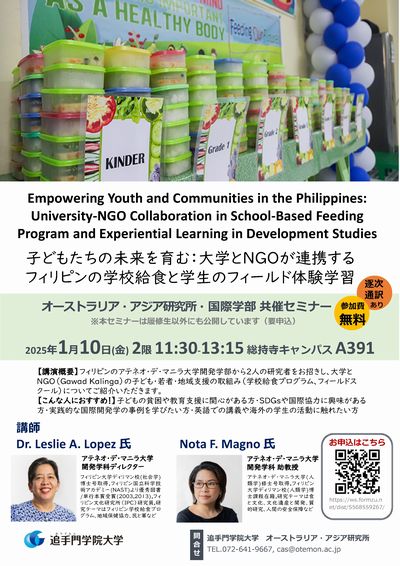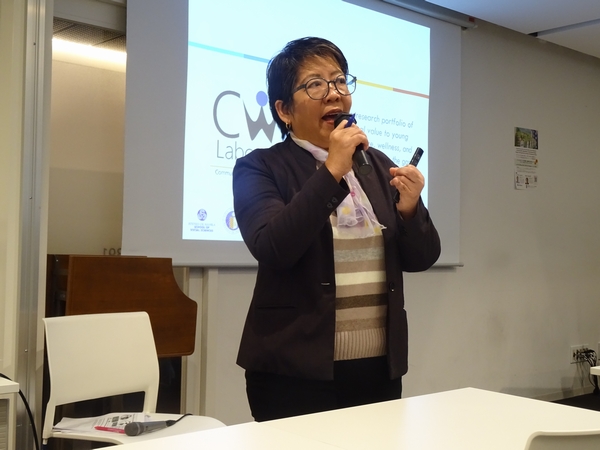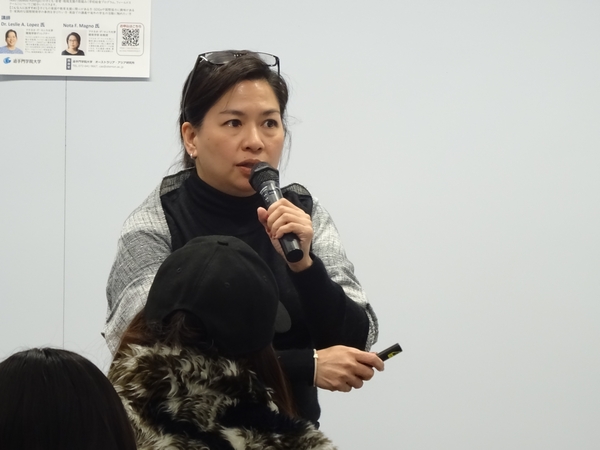2025年1月10日、オーストラリア・アジア研究所と国際学部の共催で、フィリピンのアテネオ・デ・マニラ大学より社会科学部開発学科学科長レスリー・A・ロペス博士とノタ・F・マグノ氏(助教授)をお招きし、国際セミナーを開催しました。本セミナーでは、フィリピンの学校給食プログラムや、大学とNGOが連携した地域支援の実践についてご講演いただきました。
 (画像クリックで別画面で開きます 407KB; PDFファイル)
(画像クリックで別画面で開きます 407KB; PDFファイル)
セミナーは国際学部長松宮新吾教授の開会のあいさつから始まり、「本セミナーが学びを深める貴重な機会である」との言葉が述べられました。セミナーの進行と通訳は、平井華代准教授(国際学部)が担当し、講演に加え、質疑応答や留学経験者の体験談を交えたプログラムが展開されました。
< 第一部 レスリー・A・ロペス先生:学校給食プログラムと地域支援の連携 >
ロペス博士は、“Community Kitchen and School-Based Feeding Program in the Philippines”と題し、フィリピンで実施されている学校給食プログラム(School-Based Feeding Program, SBFP)について紹介されました。

フィリピンでは、子どもの栄養不足が依然として大きな問題であり、新型コロナウイルス感染症の影響により困窮世帯の経済状況はさらに悪化し、さらなる食料不安を引き起こしました。これに対し、アテネオ教育開発センター(ACED)と、NGOのGawad Kalinga(GK)の「Kusina ng Kalinga(コミュニティキッチン)」が連携し、栄養食品パックを配布し、子どもたちとその家族を支援しました。地元の農家支援や雇用創出、子どもの学習意欲向上といった食支援を超えた多面的な効果が報告されました。
< 第二部 ノタ・F・マグノ先生:開発学における体験学習の重要性 >
続いて、マグノ氏は「Experiential Learning in Development Studies」と題し、開発学におけるフィールドスクールの役割について講演されました。

フィールドスクールは、単なる知識習得ではなく、住民と共に問題解決を行う「参加型アクションリサーチ」を重視しています。例として、フィリピンのシアルガオ島でのパイナップルの繊維を使った伝統工芸プロジェクトや、煙の少ないかまど改良プロジェクトのエピソードなどが紹介され、理論と実践を結びつける機会がいかに重要かが強調されました。「開発学を学ぶ中で、学生は貧困や環境問題、健康といったグローバルで国家的な問題に取り組むことに強い関心を抱くことがあります。しかし、実際は、地域社会の文脈を理解していなければ、これらの問題を解決するのは非常に困難です」というマグノ先生の言葉は、開発の本質を的確に表していました。
< 留学経験者の体験談 >
アテネオ・デ・マニラ大学に留学経験のある元留学生が、大学の学びが社会課題と密接に結びついていることや、フィールドでの実践を通じて知識と実践を深めた経験が、現在のキャリア形成に影響を与えたと話されました。
< 活発な学生の質問と議論および感想 >
セミナーでは、「給食を持続的に実施するための財源はどうしているのか?」、「アレルギー対応はどのように行われているのか?」など、学生から興味深い質問が寄せられました。
< 閉会の辞:行動を起こすことの重要性 >
オーストラリア・アジア研究所所長小松久恵准教授より閉会の辞が述べられました。知識を得て、それを具体的な行動につなげることが重要と述べ、学生たちが今回の学びを生かして主体的に行動を起こすことを期待しているとの言葉が贈られました。
< おわりに >
本セミナーは、フィリピンの子ども支援や大学の実践的な取り組みを知る貴重な機会となり、学生たちにとって、国際協力や地域支援について深く考えるきっかけとなったのではないでしょうか。本学では、今後もこのような学びの場を提供し、学生が世界の課題に主体的に取り組むきっかけとなることを願っています。
下記は授業後に寄せられた学生の感想の一部です。
ー フィリピンの貧困や食糧問題を知り、自分もボランティアや支援活動に関わりたいと
強く思った。
ー 自国の問題だけでなく、より広い視点で世界の課題に向き合いたいという気持ちが芽
生えた。
ー フィリピンの貧困問題について初めて詳しく知り、特に家族の中で朝食を抜く役割を
決めるという実情に衝撃を受けた。
ー 学生がフィールドスクールで苦労しながらも実践的な学びを深めたエピソードに感銘
を受けた。
ー 海外の講師の講義を聞き、英語をもっと学びたいと思った。
ー 開発学を学ぶには、単なる知識だけでなく、実際に現場に入ることが重要という考え
に共感した。
【本件に関するお問合せ】
オーストラリア・アジア研究所
E-mail: cas@otemon.ac.jp
<< English version >>
The international seminar "Empowering Youth and Communities in the Philippines: University-NGO Collaboration in School-Based Feeding Program and Experiential Learning in Development Studies" was held on January 10, 2025, co-hosted by the Australia-Asia Research Institute and the Faculty of International Studies. Dr. Leslie A. Lopez from Ateneo de Manila University and Assistant Professor Nota F. Magno delivered lectures on school feeding programs and experiential learning in development studies.
Professor Shingo Matsumiya, Dean of the Faculty of International Studies, opened the seminar, highlighting its importance in connecting academic learning with real-world social issues. The seminar was moderated and translated by Associate Professor Hanayo Hirai and included lectures, a Q&A session, and testimonials from former study-abroad students.
Dr. Lopez introduced the School-Based Feeding Program (SBFP) in the Philippines, explaining how malnutrition remains a significant issue, worsened by the COVID-19 pandemic, and thus, prevented the successful in-school learning of public elementary school students. In response, the Ateneo Center for Educational Development (ACED) and the NGO Gawad Kalinga collaborated to provide nutritional food packs, support local farmers, and engage community volunteers in food preparation and distribution, ensuring both social and economic benefits. Based on the initial review, the food packs are a better option as they provide healthier fresh fruits and vegetables that are lacking in the diet of these children. Also, the whole family benefits from the food packs provided.
Professor Magno emphasized the importance of experiential learning in development studies, presenting the role of Field Schools where students directly engage with local communities. She shared examples of student-led projects, such as documenting traditional weaving practices for heritage conservation and developing low-smoke stoves, to reduce pollution and improve community health, stressing that understanding the local context is essential for addressing global poverty and environmental challenges. She noted that students are often eager to tackle large-scale issues but must first comprehend the specific social conditions of the communities they aim to support.
A former study-abroad student shared how learning at Ateneo de Manila University was deeply connected to social issues. Fieldwork and direct engagement with communities provided valuable insights that shaped her academic and career paths.
During the Q&A session, students posed thoughtful questions about the sustainability of school feeding programs and food allergy considerations. The discussion highlighted their growing interest in international development and volunteering.
In the closing remarks, Associate Professor Hisae Komatsu emphasized the importance of translating knowledge into action, encouraging students to apply their learning to real-world challenges.
Students were concerned about food security in Southeast Asia as it relates to increasing food prices and lack of nutrition for members of low income families. They were alarmed by the lack of such a basic necessity as food, that affects all other human needs. They also began to reflect on how they can contribute solutions to such problems, possibly including studying abroad to learn the conditions of other societies by experiencing them firsthand.
The seminar provided an opportunity to deepen their understanding of international cooperation and the role of universities in addressing social issues, reinforcing the importance of experiential learning in fostering a global mindset.










